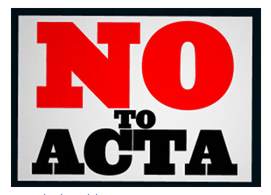| SOPA and PIPA Shelved But Is ACTA Unstoppable? |
| Written by Sue Gee |
| Sunday, 22 January 2012 |
|
Last Wednesday's blackout by Wikipedia, Reddit and other sites raised awareness of PIPA and SOPA but there's another threat to the open Internet, ACTA and has already been signed in US and elsewhere. Update: ACTA Protest is gathering force and there have already been some significant delvelopments in the campaign to ensure it is not ratified by trhe European Parliament, see ACTA Protest Mounts and
There has been jubilation about the fact that both the PIPA and SOPA bills that were being debated by the US Congress have stopped being an immediate menace. Yes the action taken by Wikipedia had the desired effect, as did the signatures of the citizens who petitioned President Obama. However, in reality we should view the outcome as a temporary setback for the supporters of this legislation. They will no doubt try again and we just have to hope that the next proposed legislation is less draconian. The lasting achievement of the Internet Strike was that it alerted ordinary Internet users to the idea that there are freedoms we currently take for granted that could be blocked with widespread adverse affects. But while many more people now know about SOPA and PIPA, how many have heard of ACTA - which by having the status of an international trade agreement rather than one country's law has been introduced without the level of debate accorded to proposed legislation?
According to La Quadrature du Net, a French advocacy group that promotes the rights and freedoms of citizens on the Internet: ACTA is one more offensive against the sharing of culture on the Internet. ACTA (Anti-Counterfeiting Trade Agreement) is an agreement secretly negotiated by a small "club" of like-minded countries (39 countries, including the 27 of the European Union, the United States, Japan, etc). Negotiated instead of being democratically debated, ACTA bypasses parliaments and international organizations to dictate a repressive logic dictated by the entertainment industries. La Quadrature says ACTA aims at imposing new criminal sanctions and online censorship in the name of copyright. The US, Canada and many other countries have already signed the ACTA agreement and it was recently adopted by the European Union but it has yet to be debated by the European Parliament and so there is still a short window for protest against ACTA to prevent it being enacted. Watch the video below to discover why we need to say No to ACTA and refer to La Quadrature's Wiki to discover how to take action against it.
At this time the Internet is under more threat from sources that are alien to it, or worse fear it, than at any other. However, we are not good at spotting legislative controls that could harm what we do. Partly because it is a different technology and we don't know the jargon, but mainly because stealth works in the favor of any party trying to pass restrictive legislature. In the past most of the attempts to control the Internet have come from commercial interests, and piracy was its main target. Now, after the successes of the Internet in enabling revolutions to start and proceed, there is a raw political desire to curb the power of the web. This isn't based on money, but on fear. The big problem is that, even when we do notice, the ethos of the web works against us. The web should be open, information should be free and, even when Wikipedia went dark to protest against a bill that would clearly damage the Internet, many Wikipedians thought it was a bad thing for the most noble enterprise, an encyclopedia, to get embroiled in politics. We desperately need a less idealistic view of the web, one that can defend its freedoms while minimizing the evil within. More InformationRelated ReadingSOPA Shelved - But What About Protect IP ACTA Protest Mounts
{loadposition comment}
To be informed about new articles on I Programmer, subscribe to the RSS feed, follow us on Google+, Twitter, Linkedin or Facebook or sign up for our weekly newsletter. {loadposition moreNEWS} {loadposition moreNEWSlist} |
| Last Updated ( Saturday, 04 February 2012 ) |
